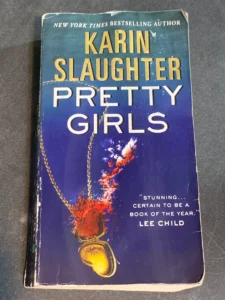
Riveting, if disturbing, is how to describe Karin Slaughter’s 2015 book, Pretty Girls. Almost from the first page until the 573rd page, I was glued to the tiny print of this mass market paperback to see if these “pretty girls” would survive the hell they were experiencing and fighting through.
Julia, Lydia, and Claire are sisters, with parents Helen and Sam, and in 1991, Julia, only 19, “goes missing.” The local sheriff thinks she absconded with some hippies. Years pass. Sam and Helen’s marriage breaks down, as Sam becomes obsessed with finding out what happened to Julia. Lydia falls into addiction, and Claire, seemingly, has a great life. She’s been married to Paul for 18 years, and lives a rich lifestyle, albeit, we’re introduced to her with the the fact of her being on parole for … something, and that she’s likely cheated on him. Then, when Claire and Paul try to get frisky in an alleyway, they’re robbed and Paul is killed.
We then learn that Lydia — who I didn’t realize yet was Claire’s sister because I don’t read the synopsis of books if I can help it — is not only Claire’s sister, but she’s thrilled at the news of Paul’s death because she claimed 18 years ago that he tried to rape her. Claire and Helen brushed her off, though, instead believing Paul (I’m not sure we get a reckoning of why Helen did, but we do later with Claire and then forgiveness from both sisters). That made me disdain Claire, admittedly, which is the point, I believe. Claire is flawed. Lydia’s flawed. Helen’s flawed. Even Sam is flawed. But they share the bonds of a.) being family and b.) sharing the trauma and tragedy of Julia’s likely abduction and murder.
After his funeral, Claire goes digging around and learns Paul was into smut pornography, with one video featuring a young girl with a striking resemblance to a missing girl on the news. She’s not sure if the videos are depicting real torture, rape, and murder, or not. She then learns Paul has been keeping tabs on Lydia for the past 18 years, and scores of other women, too. In fact, the entire façade Paul manifested around Claire — a fitting descriptor because Paul’s a meticulous architect — begins to crumble, as Claire uncovers more truths about who he really was. Or … is, as his death was just one more façade. He tricked the FBI into putting him into the witness protection program and thereby faking his death in a bid to catch a supposedly bigger fish via Paul. Indeed, though, Paul does have a bigger fish: a Congressman who is also his uncle.
Paul, the Congressman, the sheriff who “investigated” Julia’s disappearance in 1991, and the current investigator are all caught up in the same sick torture, rape, and murder conspiracy and web (literally, as they use the dark web to distribute this sick crap). Now, you might wonder, why would someone go into public office knowing that something like that could be unearthed by their political rivals or the media one day? Arrogance and the yearning for more power and control of others wins the day over staying in the shadows. Of course, the Congressman did get away with it for decades.
I obviously didn’t guess the extent of Paul’s psychopathic behavior and how deeply involved he was with the family, and I certainly didn’t see his “resurrection” coming, but there was a red flag for me along the way. Slaughter intersperses the present happenings with past letters Sam wrote to Julia talking about the three sisters and his search for what happened to her, including his desire to bring her home, even if she was dead. Then, we later learn that Sam apparently committed suicide. Red flag alert! Absolutely not. The man in those letters was not going to commit suicide. Maybe die prematurely of a stroke (he already suffered a few) or a heart attack, but committing suicide? Nope, that didn’t ring true. And indeed, as it happens, Paul killed him when Sam was on to his psychopathic ways early on in his courtship of Claire and mind you, forced him to watch the torture, rape, and killing of Julia before killing him.
Yes, Paul, his father, the Congressman, and the sheriff were all behind Julia’s death, and then Paul killed the father, sabotaged Helen’s connection with Lydia, as well as Claire’s, and of course, courted Claire in the first place. My only criticism of Slaughter’s book, which again, I absolutely devoured over two days, is that Paul was almost too darn omnipotent and omniscient across two decades, starting when he was 15-years-old and to the present day of so easily duping the FBI. Granted, Claire ruminates on this, too, with frustration, but in the end, I think that’s what leads to his downfall and Claire gaining the upper-hand on Paul, and killing him and rescuing Lydia (who Paul abducted and was torturing after he surprised Claire with his “resurrection”). Thinking himself so omnipotent and omniscient, or to put a finer point on it, in control, is what led him to underestimating Claire’s cleverness. She’s more than just a “pretty girl.”
Before he dies though, Claire has an epiphany about where Julia is buried (near them in a well), and there’s a beautiful moment as Lydia and Claire work to unearth the well and find Julia, all these years later, and bring her home. For Sam. For them. For the family. For Julia. And then Slaughter ends the novel with a final letter from Sam, imagining his daughter’s wedding, if she lived. A beautifully rendered, realized, and earned ending from Slaughter.
This was an unnerving, and at times, unrelenting read, but one in which I couldn’t put down or look away from. That’s quite the achievement and balancing act for an author to pull off, and Slaughter did.
